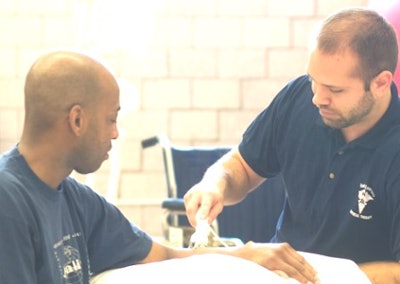 Hampton officials say that while the initiative is focused on reducing health disparities, the project’s overall goal is to improve the health of all Americans.
Hampton officials say that while the initiative is focused on reducing health disparities, the project’s overall goal is to improve the health of all Americans.After pulling together a group of historically Black institutions with notable experience in minority-focused health research, Hampton University officials have announced that the National Institute on Minority Health and Health Disparities is awarding the university a five-year, $13.5 million grant to lead an HBCU consortium to combat and reduce health disparities in minority men. The HBCUs partnered with Hampton are Jackson State University, Clark Atlanta University, Howard University, North Carolina A&T State University and St. Augustine’s University.
The Hampton University Men’s Health Initiative has identified six core areas on which it will implement comprehensive solutions to health disparities that disrupt and cut short the lives of minority males, particularly that of African-American men. The initiative is focusing on prostate cancer, cardiovascular disease, diabetes, obesity, melanoma in Hispanics and violence prevention. The researchers will be implementing a sustainable collaborative research model in each of the six areas to bring about improved health outcomes for minority men.
“The incidence of prostate cancer, heart disease, diabetes, and these other conditions have been particularly devastating in the Black community,” says Dr. William Harvey, the president of Hampton University. “This initiative will focus on four approaches to combatting health disparities – research, education, training, and intervention outreach.”
Hampton officials say that while the initiative is focused on reducing health disparities, the project’s overall goal is to improve the health of all Americans.
Harvey explained that the consortium was developed such that initiative’s research and clinical work would benefit from the particular strengths of the individual schools. For example, Harvey noted that Hampton, after having developed its widely-acclaimed $225 million Proton Therapy Institute as an innovative approach to fighting cancer, is well-positioned to focus on prostate cancer, which disproportionately affects minority men. According to the American Cancer Society, Black men have a 59 percent higher incident rate of prostate cancer than White men.
In another example, Jackson State University has developed a strong reputation for its health disparities research and intervention around cardiovascular disease, according to officials. Harvey notes that the Howard University psychology department will be playing a key role with violence prevention and that Clark Atlanta University researchers have been heralded for their cancer therapy research.
“I believe in working together to emphasize the collective power that HBCUs can exert to solve problems. This initiative is not about Hampton, but what HBCUs can accomplish when they bring their respective strengths to a project and work together,” he says.
Terone Green, an expert of minority health care programs and the national director for alliance development with the Sullivan Alliance, credits Harvey with putting together what Green sees as an impressive coalition of HBCUs. The Hampton initiative “plays well into the position Dr. Harvey has taken as it relates to issues around African-Americans, especially men, after leading the successful development of proton beam center,” he says.
“This [initiative] is a natural extension of what [Harvey’s] attempting to do to address health disparities,” notes Green.
He adds the grant award is significant because it’s unusual to see the National Institute on Minority Health and Health Disparities awarding a grant as large as the one that’s going to the Hampton University Men’s Health Initiative. “Typically, what you see are multi-year grants in the $5 million to $6 million range,” says Green, who has served on the institute’s advisory board.
Dr. Raymond Samuel, a Hampton University chemical engineering professor and the initiative’s co-principal investigator, says researchers with the initiative will focus on planning in the first year, which has just gotten underway. The initiative is receiving $1.5 million in its first year and $3 million annually in subsequent years, according to Samuel.
“We’re really at the stage of putting together an infrastructure and administrative system for the consortium,” Samuel said.
He explained the federal award “is not the biggest grant that’s been awarded to us, but it’s the largest one to focus on biomedical research.” Hampton University’s track record in scientific and technical research has largely resulted from university work in physics, astronomy, and atmospheric sciences, Samuel noted.





















